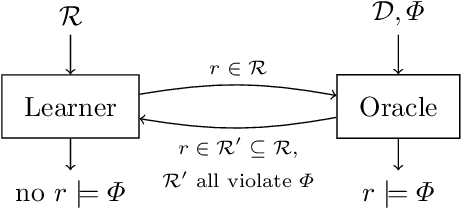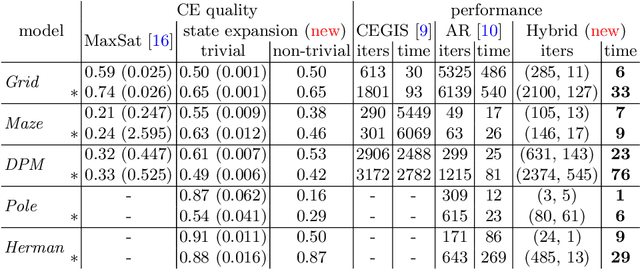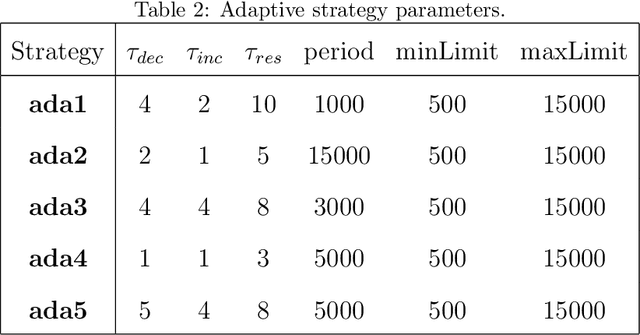Milan Ceska
Deductive Controller Synthesis for Probabilistic Hyperproperties
Jul 10, 2023Abstract:Probabilistic hyperproperties specify quantitative relations between the probabilities of reaching different target sets of states from different initial sets of states. This class of behavioral properties is suitable for capturing important security, privacy, and system-level requirements. We propose a new approach to solve the controller synthesis problem for Markov decision processes (MDPs) and probabilistic hyperproperties. Our specification language builds on top of the logic HyperPCTL and enhances it with structural constraints over the synthesized controllers. Our approach starts from a family of controllers represented symbolically and defined over the same copy of an MDP. We then introduce an abstraction refinement strategy that can relate multiple computation trees and that we employ to prune the search space deductively. The experimental evaluation demonstrates that the proposed approach considerably outperforms HyperProb, a state-of-the-art SMT-based model checking tool for HyperPCTL. Moreover, our approach is the first one that is able to effectively combine probabilistic hyperproperties with additional intra-controller constraints (e.g. partial observability) as well as inter-controller constraints (e.g. agreements on a common action).
Inductive Synthesis for Probabilistic Programs Reaches New Horizons
Jan 29, 2021



Abstract:This paper presents a novel method for the automated synthesis of probabilistic programs. The starting point is a program sketch representing a finite family of finite-state Markov chains with related but distinct topologies, and a PCTL specification. The method builds on a novel inductive oracle that greedily generates counter-examples (CEs) for violating programs and uses them to prune the family. These CEs leverage the semantics of the family in the form of bounds on its best- and worst-case behaviour provided by a deductive oracle using an MDP abstraction. The method further monitors the performance of the synthesis and adaptively switches between the inductive and deductive reasoning. Our experiments demonstrate that the novel CE construction provides a significantly faster and more effective pruning strategy leading to acceleration of the synthesis process on a wide range of benchmarks. For challenging problems, such as the synthesis of decentralized partially-observable controllers, we reduce the run-time from a day to minutes.
Adaptive Verifiability-Driven Strategy for Evolutionary Approximation of Arithmetic Circuits
Mar 05, 2020



Abstract:We present a novel approach for designing complex approximate arithmetic circuits that trade correctness for power consumption and play important role in many energy-aware applications. Our approach integrates in a unique way formal methods providing formal guarantees on the approximation error into an evolutionary circuit optimisation algorithm. The key idea is to employ a novel adaptive search strategy that drives the evolution towards promptly verifiable approximate circuits. As demonstrated in an extensive experimental evaluation including several structurally different arithmetic circuits and target precisions, the search strategy provides superior scalability and versatility with respect to various approximation scenarios. Our approach significantly improves capabilities of the existing methods and paves a way towards an automated design process of provably-correct circuit approximations.
Shepherding Hordes of Markov Chains
Mar 26, 2019



Abstract:This paper considers large families of Markov chains (MCs) that are defined over a set of parameters with finite discrete domains. Such families occur in software product lines, planning under partial observability, and sketching of probabilistic programs. Simple questions, like `does at least one family member satisfy a property?', are NP-hard. We tackle two problems: distinguish family members that satisfy a given quantitative property from those that do not, and determine a family member that satisfies the property optimally, i.e., with the highest probability or reward. We show that combining two well-known techniques, MDP model checking and abstraction refinement, mitigates the computational complexity. Experiments on a broad set of benchmarks show that in many situations, our approach is able to handle families of millions of MCs, providing superior scalability compared to existing solutions.
 Add to Chrome
Add to Chrome Add to Firefox
Add to Firefox Add to Edge
Add to Edge